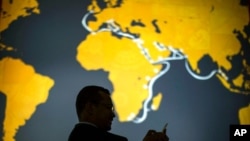In a world replete with international economic and trade organizations — most of them best known by acronyms such as WTO, OECD, APEC, ITO, TPP and MERCOSUR — who needs one more?
Apparently Canada, which is eagerly seeking to join Chile, New Zealand and Singapore in a new grouping known as the Digital Economy Partnership Agreement, or DEPA.
The three DEPA signatories are still considering Canada's bid to join the partnership, which entered into force just three months ago, although Chile must still ratify its participation. Other countries interested in joining include Japan, South Korea and Britain.
DEPA's appeal, according to analysts, lies in its narrow focus on digital issues and the fact that there is no huge economic power among its members to dominate discussions and drown out the smaller countries.
"The three signatories to DEPA are all large trading countries but relatively small economies," University of Toronto professor David Wolfe told VOA.
"The challenge for them, and for Canada, is that the multilateral era is effectively dead," creating a space for groupings like DEPA where smaller countries can enjoy greater leverage in dealing with other nations.
Room to grow
DEPA officials say the partnership is designed to focus on specific issues, including artificial intelligence (AI), digital identities and digital inclusion. Digital inclusion includes, for example, New Zealand's commitment to its Maori population.
"The DEPA is a stand-alone, open plurilateral agreement to which other World Trade Organization members are eligible to join," says a statement on the Canadian government website. "It is constructed as a living agreement, which allows for continual updates and modernization as required."
Wolfe said Canada is likely attracted to DEPA because it is an agreement in transition with plenty of room to grow. "My suspicion is they see a chance to get in relatively early on the ground floor, get our trading and negotiating interests put on the table," he said.
"I think New Zealand's agenda, and I'm sure Canada shares this, is to negotiate this among a small number of relatively small economies, get a framework that serves our interests well, then assert this into bilateral and multilectal agreements, including the WTO."
Wolfe adds that the three initial signatory countries are "all relatively equal in power. None of these three countries is going to dominate relations."
Boston University professor Jorge Heine says DEPA helps to fill a need made more urgent by the coronavirus pandemic, which "has accelerated the demand for digital services, both domestically and internationally."
"Given the fact that most international trade rules were set up for the trade in goods, this was badly needed," said Heine, who previously served as Chile's ambassador to China, India and South Africa.
"The DEPA is only a first step, and much more remains to be done, but it is a step in the right direction," he told VOA. "For issues related to e-commerce, e-invoicing and data location, it is critical to find common ground and common rules, and the DEPA aims to achieve that."
Seeking access
Experts say that for New Zealand, the agreement provides an opportunity to expand both its influence and its economic opportunities.
"Officials here don't talk much about soft power," New Zealand-based defense expert Stephen Hoadley said in an interview. "They just do it unconsciously and conscientiously, because that's the nature of the New Zealand liberal ethos. New Zealand is a soft power exemplar. It has almost no hard power."
Meanwhile, Hoadley said, New Zealand is interested in "getting New Zealand products access into markets guarded by sometimes protectionist governments."
"This has been New Zealand's basic policy since Britain joined the EU a half-century ago," he added, noting that DEPA comes at a time when the country is negotiating for new trade agreement with Britain and the EU.
Hoadley said that Singapore and Chile were natural partners in DEPA as "these three partners have long been trade liberalization leaders."
DEPA "establishes an example of cooperation between Asia-Pacific democratic free-market economies in contrast to that of China," he added.
For Singapore, the attraction of DEPA has much to do with current trends in the Indo-Pacific region.
"There is tremendous digital potential in Asia," said Steven Okun, a senior adviser with McLarty Associates based in Singapore. But there is risk that the potential will not be fully realized because of "the worrying trend of rising digital protectionism."
"For example, Indonesia continues to inhibit digital trade by maintaining rapidly changing and often opaque data-related regulations. While the government has decreased some restrictions, including allowing commercial banks and insurance companies to transfer and store some data offshore, recent legislation has been largely protectionist."
Vietnam also continues to "impede international trade in digital services," said Okun, who served as deputy general counsel at the U.S. Department of Transportation during the Clinton administration. He is currently governor of the American Chamber of Commerce in Singapore.




